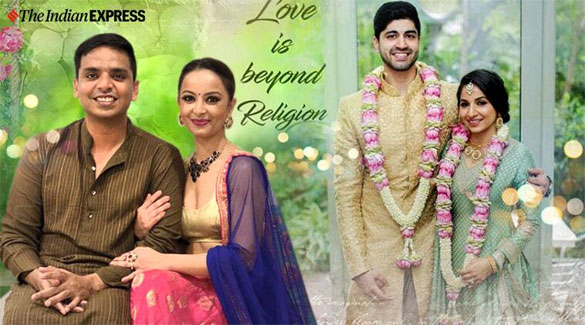Marrying Non-Muslims: In Interfaith Marriages the Proselytization Process Should Be Stopped

By
Mushtaq Ul Haq Ahmad Sikander, New Age Islam
27 July
2022
Scholars
Like Maulana Manazir Ahsan Geelani And Shams Naveed Usmani Have Articulated The
Scope Of Ahle Kitab To Buddhists And Hindus Too; They Believe That Such Large
Number Of People And Region Cannot Be Bereft Of The Prophets Of God
Main
Points:
1. Marrying
Non-Muslims raises numerous issues for the spouses, families and communities
2. The process
of conversion for marriage should be debarred and discouraged
3. Interfaith
marriages should be registered in local courts instead of being solemnized
according to religious rituals
-----

(Designed
by Gargi Singh)
---
Marriage is
a sacred institution in Islam. So is the case with most religions. They lay
down specific conditions about marriage. The rights, obligations and duties are
enshrined specifically for the spouses who enter into the serene bond of
marriage. In Islam after specific conditions have been met by both partners and
families marriage is solemnized. Then there are specific guidelines for both
husband and wife. Later on if disputes arise, the process of resolving them is
enumerated too, so is the fact of divorce to end the marriage. If the
reconciliation between the spouses fail, then divorce becomes inevitable. This
is quite a normal process of marriage, its outcome or end.
In South
Asia, problems arise if there are interfaith marriages. For some groups Muslim
men are targeting young Hindu women, making them fall in love with them and
then converting them to Islam after marrying them. So this whole process has
been termed as Love Jihad, a term whose origins remain unknown. Love Jihad has
been used to reinforce Islamophobia in India. In Pakistan, the Hindu minority
regularly alleges that Muslim men abduct Hindu girls, convert them under
coercion to Islam and then they are married off to Muslims, who then give birth
and raise Muslim children. Similar is the cases in other countries where
Muslims allege that non-Muslims abduct their women, convert and marry them.
----------------------------------------------------------------------
Also
Read: Interfaith Marriage: The Dilemma of Inequality In
Religion Facing Muslim Female In Modern World
----------------------------------------------------------------------
Marriage is
something that used to take place within the members of certain community and
religion. It was based more on specific caste, regional and religious lines in
South Asia. These factors still constitute a norm in South Asia, but due to
modern means of communication, more interaction among opposite genders through
education and economic factors, inter caste, faith and regional marriages are
increasing in frequency. But these marriages mostly lead to backlashes and
repercussions. Sometimes the spouses are killed and these killings are carried
by their respective families in the name of saving honour. At other times,
whole families and communities are targeted by the aggrieved communities. Now
few states in India have brought laws against conversion and interfaith marriages.
The Quran
espouses Muslims to marry pious men and women. “Good women are for good men
and good men are for good women.” (Al Quran 24:26) Similarly Quran permits
Muslim men to marry women of the book (Ahle Kitab) meaning Jews and Christians
(Al Quran 5:5). In India, some scholars like Maulana Manazir Ahsan Geelani and
Shams Naveed Usmani have articulated the scope of Ahle Kitab to Buddhists and
Hindus too. They believe that such large number of people and region cannot be
bereft of the Prophets of God. So Mahatma Gautam Buddha and Bhagwan Ram/Krishna
can be Prophets of God. So their followers certainly constitute people of book.
Hence, Muslim men when they fall in love with Hindu women, utilize this
specific minority opinion to marry Hindu women. But then they mostly convert
them to Islam, because only then the Nikah will have religious sanctity because
the Qazi or Mufti who solemnizes the Nikah does not believe or may not have
heard about Hindus being Ahle Kitab. So she has to convert. The Muslims
also rejoice that they have added another member to their community. This
number game among Muslims has its own specific roots. They prefer quantity over
quality.
----------------------------------------------------------------------
----------------------------------------------------------------------
The
marriage with Ahle Kitab (Jews and Christians) too in South Asia is solemnized
by converting them. Although, Quran does not go into specifics about how the
marriage is to be solemnized, between Muslims and people of the book, but
certainly the need to convert them is not emphasized, although worshipping and
praying in their manner is abhorred as they associate partners with God. Now
for many scholars and theologians, this order was specific to Ahle Kitab
who existed during the time of Prophet Muhammad (pbuh) and the time of
revelation of Quran, but now the circumstances and religion of Ahle Kitaab has
changed too much that it is not advisable to marry Ahle Kitab women.
For Muslim
women it is a categorical denial to marry any man who is not a Muslim (Al Quran
2:222). Islam does not hold such a marriage valid. Further, the Muslim
community too gets angry when a Muslim woman marries a Hindu man, exposing the
double standards of the community, who have different parameters to judge
between men and women marrying outside the Muslim community. So marriage,
particularly the interfaith one is condemned and deeply abhorred, if it
involves a Muslim woman. Islam believes that man as a head of family will
transfer his religious values to the children, so if he takes a non-Muslim
wife, it is not a problem. Further, man being head of the family and
controlling women particularly the wife will definitely not let her religious
beliefs and values be transmitted in family and children. Islam gives sanction
to such marriages, although finer details are not deliberated about the beliefs
of children, divorce process and how to resolve conflicts if they arose in such
a marriage.
The
interfaith marriages according to some scholars need to be abhorred because now
even the Ahle Kitab has deviated from the correct path. Then the
marriage where Muslim men elope with non-Muslim women and later convert them
should be desisted too. Also if any Muslim or non-Muslim is involved in an
affair that will lead to marriage, then there should be no compulsion for
conversion or proselytization. Islam debars any type of clandestine affairs
between opposite genders except for marriage. The private secret intimacy with
the opposite gender is condemned in unequivocal terms. So for Islam the norm is
arranged marriage and spouses are supposed to fall in love post marriage.
So in a
love marriage, the very act of love is not encouraged, so is not the conversion.
If Muslims and non-Muslims marry they should not convert each other for the
sake of getting married, instead marry in an open court and get their marriage
registered. This will resolve the issue of love Jihad and other such issues
arising from these marriages. Why should religion be invoked at the time of
marriage, when it was out of equation completely when the couple fell in love?
Also later the children born out of this wedlock should have the choice to
adopt any religion instead of imposing a certain version of religion. Only then
the issues arising from such marriages will be resolved. Muslims too need to
come out of the proselytizing mind-set because they think it as a moral duty to
convert others. It is an obligation to present Islam before non-Muslims but
just increasing numbers is never an aim of Islam. So in interfaith marriages
the proselytization process should be stopped.
-----
A New
Age Islam columnist, M.H.A. Sikander is Writer-Activist based in Srinagar,
Kashmir
URL: https://newageislam.com/interfaith-dialogue/interfaith-marriages-proselytization/d/127579
New Age Islam, Islam Online, Islamic Website, African Muslim News, Arab World News, South Asia News, Indian Muslim News, World Muslim News, Women in Islam, Islamic Feminism, Arab Women, Women In Arab, Islamophobia in America, Muslim Women in West, Islam Women and Feminism
